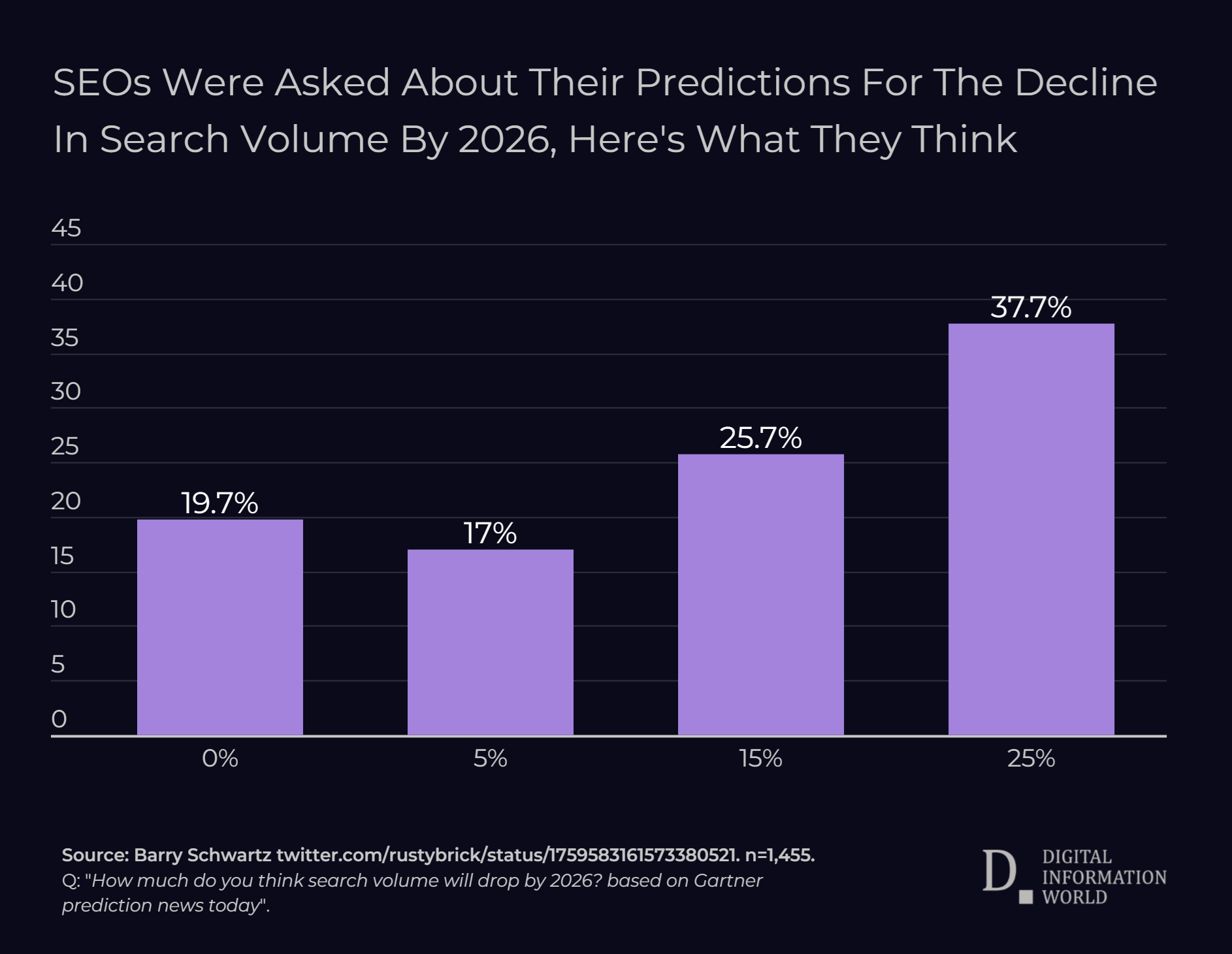A recent prediction by Gartner, a renowned research firm, suggests that traditional search engine volume might decrease by 25% by 2026. This change is expected as AI chatbots and virtual agents gain traction, potentially impacting search marketing. In light of this forecast, a survey was conducted by Barry Schwartz among SEO experts to gather their perspectives on the future of search volume.
The survey (based on 1,455 votes) revealed a significant concern among SEO professionals, with nearly 40% (37.7 percent to be exact) believing that search volume will indeed decline by 25% or more as predicted. Conversely, less than 20% of respondents are optimistic that search volume will remain unchanged.
Alan Antin, a Vice President Analyst at Gartner, emphasized the critical role of organic and paid search for tech marketers aiming to achieve awareness and demand generation goals. He highlighted that generative AI (GenAI) solutions are emerging as alternative sources for answers, potentially replacing queries that would typically be directed to traditional search engines. This shift could necessitate a strategic reevaluation of marketing channels as GenAI becomes more integrated into various business aspects.
A light-hearted exchange on the topic took place between Barry Schwartz and Google's John Mueller. Schwartz jokingly remarked that SEO might become "25% more dead" by 2026, to which Mueller responded affirmatively about the inevitability of change. He stressed that adept SEOs are well-equipped to navigate such changes, underscoring the importance of creating technically proficient, high-quality websites that add value for businesses and web users alike.
This conversation underscores the adaptive nature of SEO professionals who have historically evolved their strategies to align with technological advancements and changing market dynamics. As the digital landscape continues to evolve, particularly with the rise of AI, the SEO community is poised to tackle new challenges and opportunities that come their way.
The survey's findings and discussions around it illustrate the broader industry's anticipation and preparedness for the potential shifts in search behavior and the increasing role of AI in shaping future marketing strategies.
Read next: Is Google’s Review System Algorithm Biased? Tech Giant Responds To Allegations Of Manipulation
The survey (based on 1,455 votes) revealed a significant concern among SEO professionals, with nearly 40% (37.7 percent to be exact) believing that search volume will indeed decline by 25% or more as predicted. Conversely, less than 20% of respondents are optimistic that search volume will remain unchanged.
Alan Antin, a Vice President Analyst at Gartner, emphasized the critical role of organic and paid search for tech marketers aiming to achieve awareness and demand generation goals. He highlighted that generative AI (GenAI) solutions are emerging as alternative sources for answers, potentially replacing queries that would typically be directed to traditional search engines. This shift could necessitate a strategic reevaluation of marketing channels as GenAI becomes more integrated into various business aspects.
A light-hearted exchange on the topic took place between Barry Schwartz and Google's John Mueller. Schwartz jokingly remarked that SEO might become "25% more dead" by 2026, to which Mueller responded affirmatively about the inevitability of change. He stressed that adept SEOs are well-equipped to navigate such changes, underscoring the importance of creating technically proficient, high-quality websites that add value for businesses and web users alike.
This conversation underscores the adaptive nature of SEO professionals who have historically evolved their strategies to align with technological advancements and changing market dynamics. As the digital landscape continues to evolve, particularly with the rise of AI, the SEO community is poised to tackle new challenges and opportunities that come their way.
The survey's findings and discussions around it illustrate the broader industry's anticipation and preparedness for the potential shifts in search behavior and the increasing role of AI in shaping future marketing strategies.
Read next: Is Google’s Review System Algorithm Biased? Tech Giant Responds To Allegations Of Manipulation

